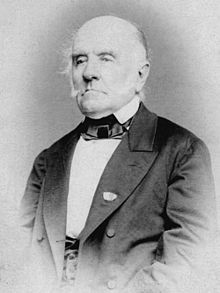Apostol Arsache
| Apostol Arsache | |
|---|---|
 |
|
| Minister of Foreign Affairs | |
|
In office 22 January 1862 – 24 June 1862 |
|
| Preceded by | office established |
| Succeeded by | Alexandru Cantacuzino |
| acting Prime Minister of Romania | |
|
In office 8 June 1862 – 23 June 1862 |
|
| Monarch | Alexandru Ioan Cuza |
| Preceded by | Barbu Catargiu |
| Succeeded by | Nicolae Crețulescu |
| Personal details | |
| Born | 1789 Hotovë, Vilayet of Yannina, Ottoman Empire |
| Died | 1869 (aged 80) Bucharest |
Apostol Arsache (in Romanian) or Apostolos Arsakis (Greek: Απόστολος Αρσάκης; 1792–1874) was a Greek-Romanian politician and philanthropist. He was one of the major benefactors of 19th-century Greece, while at the same time he became a leading political figure in Romania.
Arsache was born in the village of Hotovë, Përmet District, southern Albania (Northern Epirus), then in Ottoman Empire. In 1800 Arsache moved together with his family to Vienna, there he was educated in a school of the local Greek diaspora. Among his teachers was Neophytos Doukas, prominent figure of the modern Greek Enlightenment. At 1807 Doukas published an epigram composed by Arsache about the work, Breviarium historiae Romanae, of historian Eutropius. He then went to the University of Halle and studied Medicine. Arsache composed a treatise under the title Έκθεσις συνοπτική της Ιατρικής ιστορίας (Coincise Report of the History of Medicine) in Ancient Greek, which was published at the Greek periodical Hermes o Logios, in Vienna. At 1807 he published his thesis De Piscium Celebro et Medulla Spinali in Latin.
In 1814 he moved to Bucharest, Romania. In the Cabinet of Barbu Catargiu (22 January to 24 June 1862), he served as Minister of Foreign Affairs and following Catargiu's assassination on 20 June, Arsache briefly served as interim Prime Minister of Romania.
...
Wikipedia
